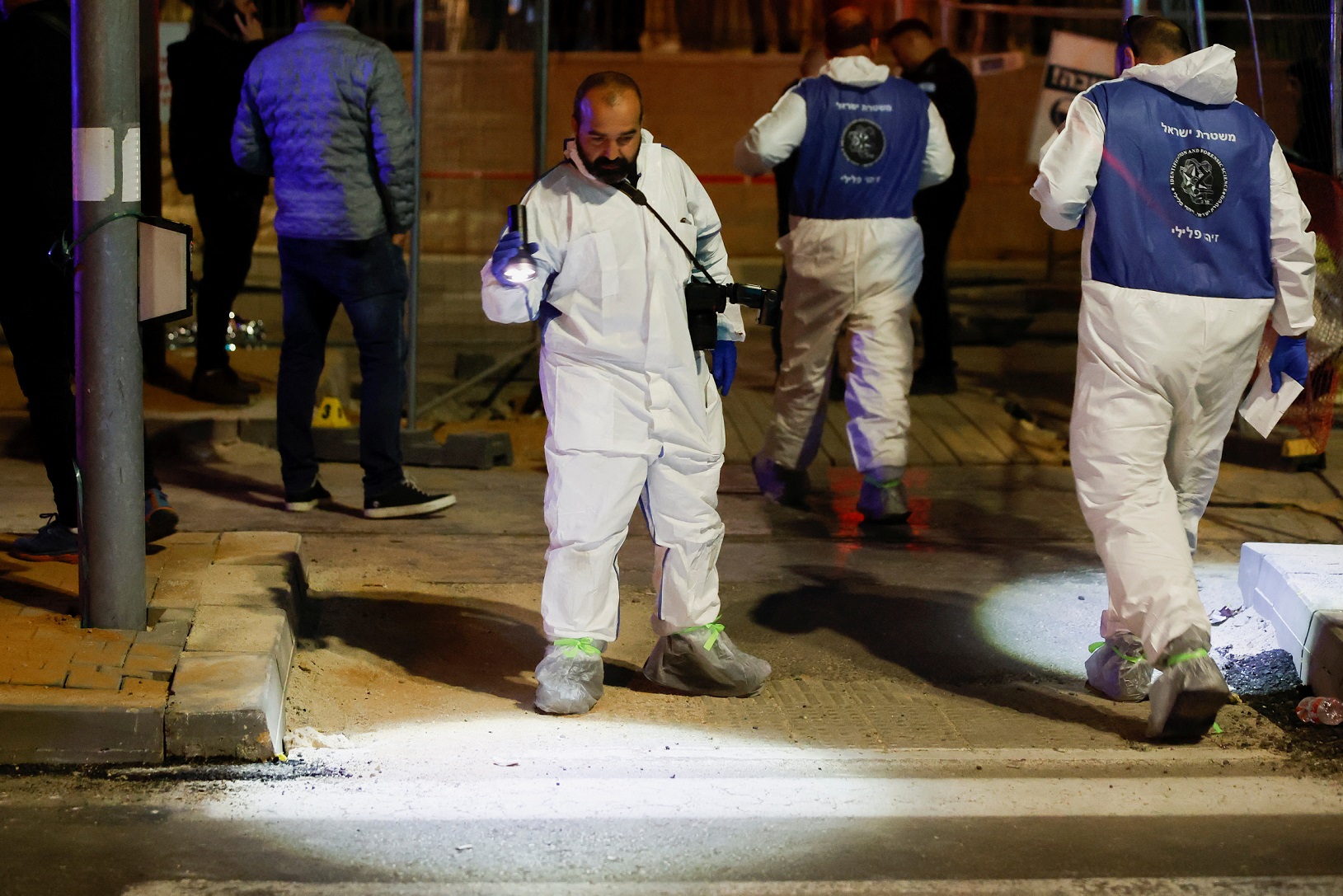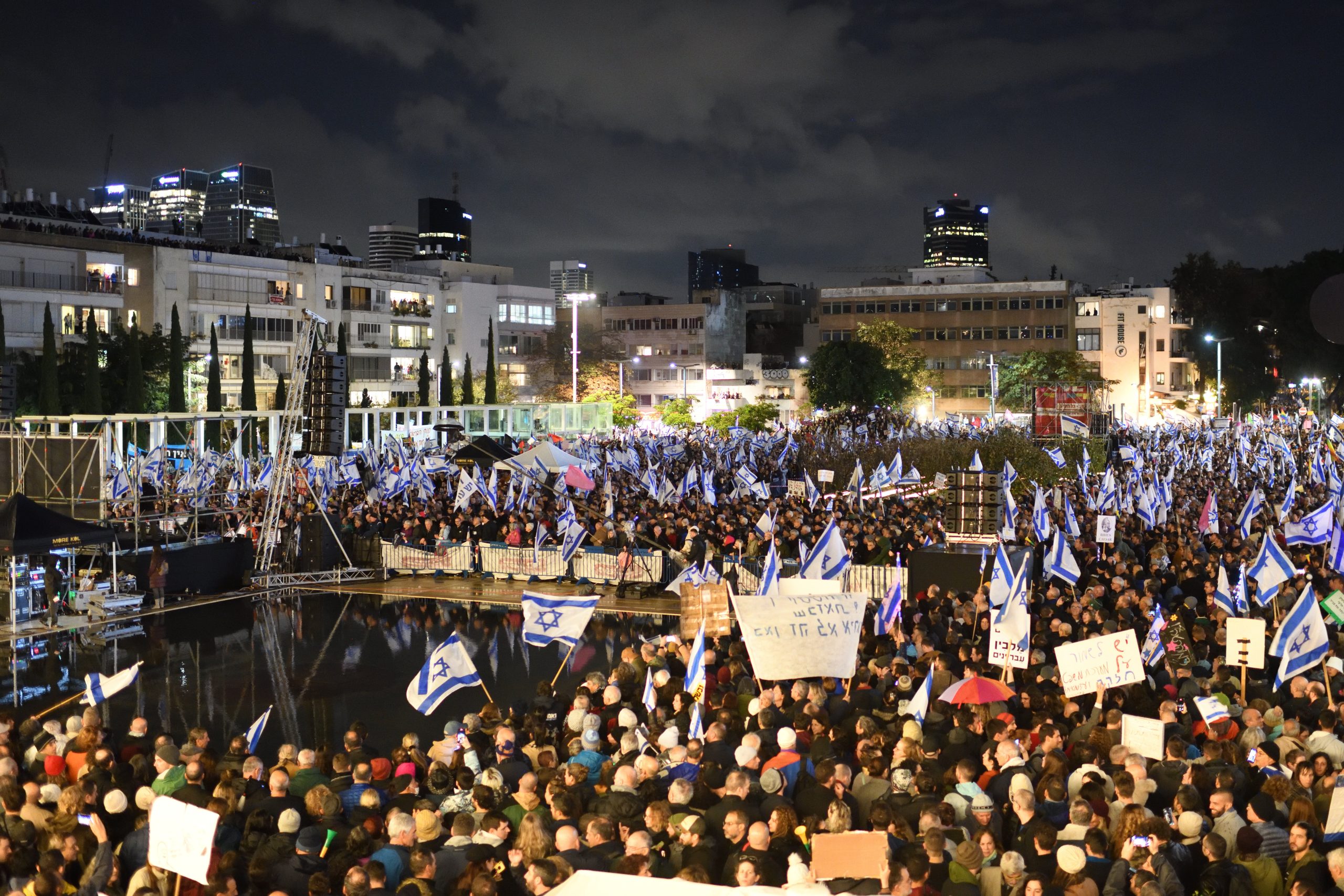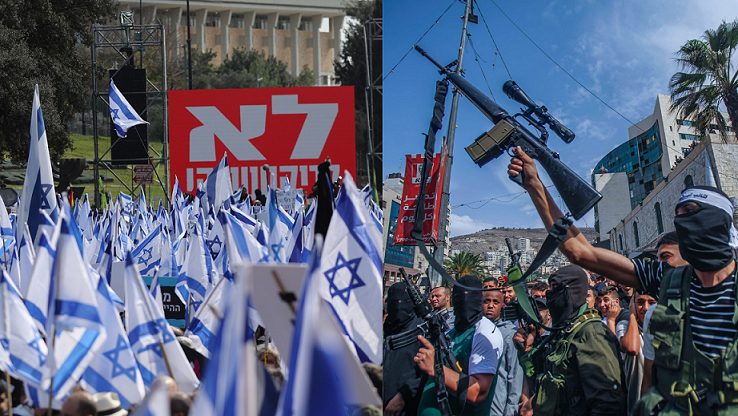Publications
INSS Insight No. 1696, March 15, 2023
The State of Israel is now engulfed in an unprecedented and perilous set of circumstances. While Iran is on the nuclear threshold and the Palestinian arena is on the brink of wide escalation, Israel itself is racing toward the brink of passing fateful legislation that would reshape its governing system. Israel’s enemies watch with satisfaction, drawing confidence and daring toward new levels of brinksmanship, which could easily lead to escalation and possibly war. For Israel to cross the legislative threshold from the current reality to the unknown depends only on a decision by the Israeli government. In a theater with multiple thresholds, and with Israel’s fate hanging in the balance, it is not too late to stop, engage in dialogue, and deliberate carefully before tumbling into a calamitous abyss.
There are growing assessments that Iran is now a nuclear threshold state, with only a political decision separating it from realizing its current capabilities and attaining nuclear weapons. From the decision to the actual enrichment of enough fissile material for a first bomb may take twelve days. Weaponization and installation on a missile or bomb would take perhaps another year or two. Beyond the threshold, a new reality awaits Iran, in which it will attempt to achieve and achieve its objective – a nuclear umbrella that will protect the regime from threats and allow it to further its subversion and aggression in the region and beyond, as well as threaten the existence of the State of Israel. In addition to the nuclear threat, several other facets of the future can be seen from the threshold: Saudi Arabia has already said that if Iran acquires nuclear weapons, it will do the same (and Riyadh’s recent agreements with Tehran will not change this). The United States has committed to prevent Iran from acquiring nuclear weapons, Israel has said it will do whatever is necessary to thwart this, and the two have exercised and coordinated to prevent this scenario. Iran will have to choose between the expected benefits of crossing the threshold to nuclear weapons and the severity and likelihood of risks on the way to this goal and beyond. Israel, for its part, is preparing to take preventive steps, perhaps in the not-too-distant future.
The past year has seen a security deterioration in the Palestinian arena, heightened by the decline of the Palestinian Authority in the twilight of the Mahmoud Abbas era, the rise of a younger generation that did not experience the intifada, incitement, the ongoing conflict and fighting, a political stalemate, and a lack of a political horizon. Since the March 2022 attacks, the IDF has been conducting Operation Break the Wave, an ongoing campaign to thwart terrorist attacks. Armed youths in the West Bank attack Israeli settlements, roads, and IDF forces, and shoot at IDF forces while terrorists are arrested. Jerusalem continues to be a volatile hotspot for terrorist attacks and for a struggle for control of the Temple Mount. The human toll is mounting, Israel has suffered severe and painful attacks, and the Palestinians, for their part, have already suffered hundreds of dead and wounded and thousands arrested. With the approach of Ramadan and the upcoming holidays (Passover, Israeli Independence Day, and Jerusalem Day; and the Palestinian Nakba and Naksa), there is a growing assessment that the theater is on the verge of a large-scale conflagration, including the possibility its spillover into Israeli territory, as during Operation Guardian of the Walls in May 2021.

The Security Council has already met twice to discuss the situation, and only with the intervention of the United States was the outcome a statement of condemnation rather than a resolution against Israel. The political-security establishments in the United States, as well as Egypt and Jordan, have sought to calm the situation before calamity strikes. On the brink, the Israeli government is promoting on the one hand a policy aimed at calming and managing the conflict, and on the other hand, an escalating policy aimed at decisive outcome. Beyond the brink – where there are signs of further escalation looming, including in and from Gaza, as well as and expanding annexation in the West Bank – the future is already in sight: an increased number IDF forces in the West Bank, the abhorrent pogrom by Jewish rioters in Huwara, while police and IDF forces were in the area, calls for erasing the village were supported by a senior minister (even if he later retracted his remark), attacks by settlers on IDF forces, and arrival at the Evyatar outpost by a minister and Knesset members, in violation of a military exclusion zone.
Concurrently, Israel is in the midst of an unprecedented political earthquake, centered on a swift and aggressive legislative campaign to change the balance of power between the branches of government. The government presents this as a judicial reform aimed at returning power to the people, the Knesset (legislature) and the government (executive), while opponents see it as a regime change to centralize all state power in the hands of the executive branch, beginning with the politicization of the judicial system toward a government that is under no restraints. The government’s accelerated campaign is aimed at finalizing the first phase of legislation before the Knesset winter session adjourns in early April and is rapidly approaching the brink of a new reality. From the current threshold, its faces are already visible: a widening social chasm, increasing violence and incitement, rapid economic decline, and petitions and warnings from senior economists, the hi-tech sector, reservists in the IDF spearhead units, Jews in the diaspora, and the administration in Washington – even though one of the US presidents most friendly to Israel now occupies the White House.
So far, the leaders of the legislative campaign toward the threshold seem to ignore all of this, accusing opponents of rejecting the results of the November election and blaming them for any negative consequences, refusing to suspend the process "even for a minute," and admit only that they failed to explain their moves. Isolated voices in the coalition call for slowing down reform and entering into negotiations according to the plan proposed by President Isaac Herzog, but the prevailing approach is to steam towards\ the threshold, beyond which is an abyss.

Abroad, the enemies of Israel, from Tehran to Beirut, rejoice. The Zionist state is attacking itself in a suicidal storm, cracks appear in its mighty army that threaten its performance and deterrence, its forces preoccupied in the Palestinian arena are unable to prepare for a possible war in Lebanon, its economy is weakening, and international support is declining. “Axis of resistance” propaganda channels have already resurrected the “spider web” campaign of 2000, which highlights the weakness of the Zionist enterprise. Hezbollah Secretary General Hassan Nasrallah predicts that Israel will not live past its 80th year. This arrogance heralds not only a long-term challenge, but also a genuine risk: the increased appetite of Israel’s enemies to incur risks and proceed to the brink, leading to possible miscalculations and escalation. Both the Second Lebanon War and the Operation Protective Edge flared up in this way, by mistake, without the original intention of the parties to escalate the situation.
Each of the external security challenges – the nuclearization of Iran, the escalation in the Palestinian arena, and the threat from the north, which in recent days has reawakened – is complex enough to command the full attention of Israel’s decision makers, when every decision, action, or inaction is fateful, and when many lives and the future of the country are at stake. However, in the current security cabinet – which anyway seldom meets – only a few have significant security experience, and it is doubtful that any can devote proper time to an in-depth study of current security issues. After two months in office, the government is heavily focused on the "judicial reform,” no doubt at the expense of focusing on the upcoming security challenges.
Standing at the threshold one is in a familiar reality, but beyond it lies an unknown expanse, somewhat visible and partly hidden. Crossing the threshold from the familiar to the beyond can occur with a conscious decision or unawares. At this time, it seems that the Israeli government is racing toward the legislative cliff while trying to brake before crossing the threshold of a broad escalation with the Palestinians. At the same time, Iran is already on the nuclear threshold, nearing a decision in Tehran that will require tough decisions in Jerusalem as well. Great efforts are underway to dissuade Iran from making the decision to weaponize, but that decision will ultimately be made in Tehran only. Escalation in the Palestinian arena depends on the behavior of both sides, and for better or worse, Israel bears significant weight in this regard.
Crossing the legislative threshold from the familiar Israel to the unknown depends only on the decision of the Israeli government. In a theater with numerous thresholds, and with Israel’s fate hanging in the balance, it is not too late to stop, engage in dialogue, and deliberate carefully before crossing the threshold into a calamitous abyss.



